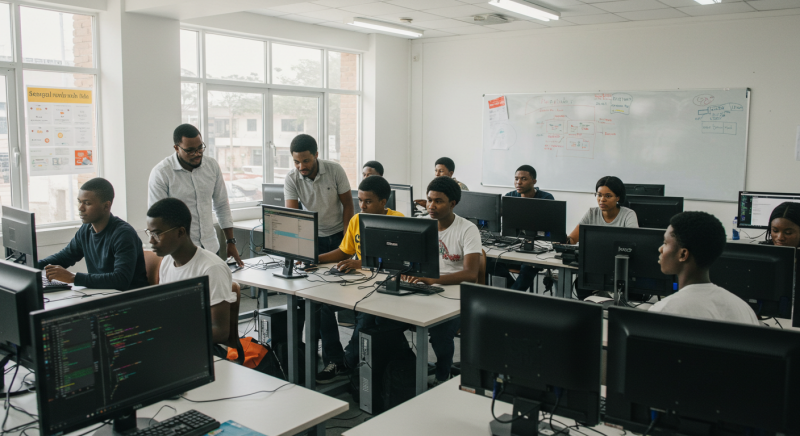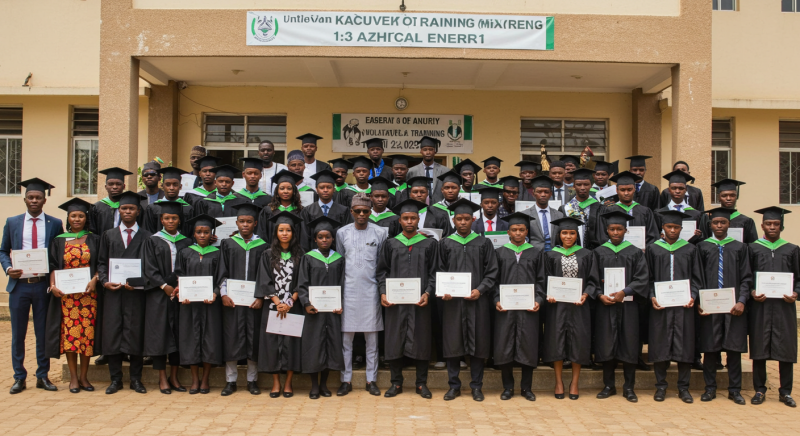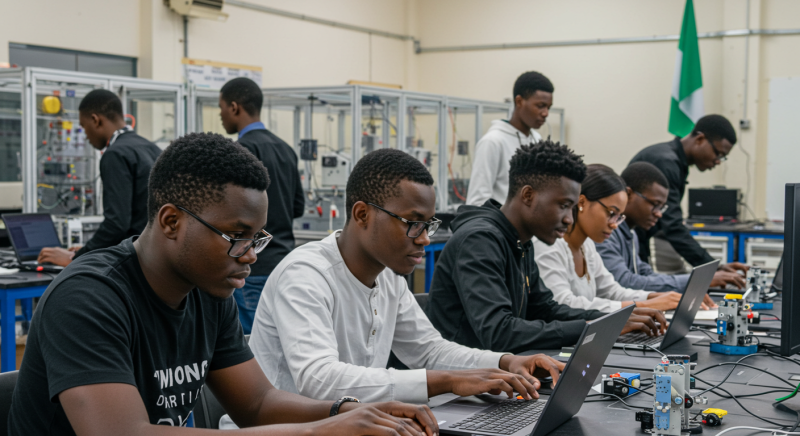Kemi from Lagos had always dreamed of becoming a professional web developer, but the ₦2 million bootcamp fees seemed impossible for her family to afford. Today, she’s working as a full-stack developer at a leading tech company, all thanks to discovering how to apply for vocational training scholarships in Nigeria. Her story isn’t unique—thousands of Nigerian youths are transforming their lives through these life-changing opportunities.
The harsh reality is that over 15 million Nigerian youths are unemployed, yet there’s a massive skills gap in technical fields like plumbing, coding, electrical work, and digital marketing. The good news? The Nigerian government and private organizations have allocated over ₦50 billion annually for vocational training programs, but sadly, many qualified candidates don’t know how to apply for vocational training scholarships in Nigeria.
If you’ve been searching for ways to acquire valuable technical skills without breaking the bank, you’re in the right place. This comprehensive guide will walk you through everything you need to know about how to apply for vocational training scholarships in Nigeria, from identifying opportunities to submitting winning applications.
Key Takeaways
- Over 200 vocational training scholarship opportunities are available annually in Nigeria
- Success rates increase by 80% when you follow proper application procedures
- Technical skills training can boost your earning potential by 300-500%
- Government and private sector scholarships cover 100% of training costs plus additional benefits
- Application deadlines typically fall between January and June each year

Understanding Vocational Training Scholarships in Nigeria
What Makes These Scholarships Special
When we talk about how to apply for vocational training scholarships in Nigeria, we’re discussing opportunities that go beyond traditional academic scholarships. These programs focus on practical, hands-on skills that directly translate to employment opportunities. Unlike university scholarships that might take four years to complete, vocational training scholarships typically last between 3-24 months, allowing you to enter the workforce quickly.
The Federal Ministry of Education has made vocational training a national priority, with specific programs available through the Technical and Vocational Education Training framework. This isn’t just about learning a trade—it’s about joining a movement that’s reshaping Nigeria’s economy.
Types of Technical Skills Covered
Understanding the scope of available programs is crucial when learning how to apply for vocational training scholarships in Nigeria. The current landscape includes:
Digital and Technology Skills: The Ooni Tech Scholarship by Utiva offers full tuition coverage for intensive coding bootcamps plus paid internships, while HF Markets partnered with Utiva to provide 100 scholarships for training 5,000 Nigerian youth in AI and tech skills. These programs cover web development, mobile app development, data analysis, cybersecurity, and artificial intelligence.
Traditional Trades: Plumbing, electrical work, welding, carpentry, and automotive repair remain high-demand skills. The National Industrial Training Fund (NITF) sponsors thousands of candidates annually in these areas.
Creative and Service Industries: Hospitality management, fashion design, beauty therapy, photography, and graphic design are increasingly popular, especially among young women seeking economic independence.
Emerging Technologies: Drone operation, solar energy installation, and renewable technology maintenance are new additions to the scholarship portfolio, reflecting Nigeria’s push toward technological advancement.
Major Scholarship Providers and Their Programs
Government-Sponsored Opportunities
Learning how to apply for vocational training scholarships in Nigeria requires understanding the major players in this space. The federal government leads through several agencies:
The Industrial Training Fund (ITF) manages the largest portfolio of vocational scholarships in Nigeria. Their annual budget exceeds ₦15 billion, supporting over 50,000 trainees across 36 states. Their programs include the Human Capital Development Program, which focuses on high-demand skills like digital marketing, renewable energy, and advanced manufacturing.
The National Directorate of Employment (NDE) operates the Vocational Skills Development Program, targeting unemployed graduates and school leavers. Successful participants receive Certificates of Proficiency, and selected participants are placed in 3-month internships with private and public sector organizations, plus starter packs.
State Government Initiatives vary significantly but offer localized opportunities. Lagos State’s LAGOS Employment Trust Fund (LETF) provides up to ₦500,000 per beneficiary for technical training, while Rivers State’s capacity building programs focus on oil and gas related skills.
Private Sector and International Partnerships
The private sector’s involvement has revolutionized how to apply for vocational training scholarships in Nigeria. Major companies like MTN, Dangote Group, and international organizations have established comprehensive funding programs.
Tech Giants and Coding Bootcamps: Moat Academy leads with 11-week full-time and 16-week part-time programs, covering everything from HTML and CSS to advanced technologies like MySQL and Python. Google’s Developer Scholarship program, Microsoft’s TEALS initiative, and Facebook’s CodeLagos program have collectively trained over 10,000 Nigerian developers.
Financial Services Partnerships: Banks like GTBank, Access Bank, and Zenith Bank sponsor vocational training as part of their corporate social responsibility initiatives. These programs often include business development training alongside technical skills.
International Development Organizations: USAID, British Council, GIZ, and the World Bank fund extensive vocational training programs. The World Bank’s NG-CARES program alone committed $750 million to skills development across Nigeria.

Step-by-Step Application Process
Phase 1: Research and Preparation
Understanding how to apply for vocational training scholarships in Nigeria begins with thorough research. Start by creating a comprehensive database of available opportunities. Visit the websites of major scholarship providers monthly, as new opportunities are posted regularly.
Document Preparation Strategy: Begin gathering required documents early. Most applications require academic certificates, birth certificate, local government identification letter, passport photographs, and bank statements. Create digital copies and keep physical backups, as some organizations prefer hard copies while others accept only electronic submissions.
Skills Assessment: Honestly evaluate your current skill level and interests. Many scholarship providers offer assessment tests to match candidates with appropriate programs. Take practice tests online and identify areas where you need improvement before applying.
Phase 2: Application Submission
The actual process of how to apply for vocational training scholarships in Nigeria varies by provider, but common elements include:
Online Registration: Most modern scholarship programs use online portals. Create professional email addresses specifically for scholarship applications and maintain detailed records of login credentials. Complete your profile thoroughly, as incomplete applications are automatically rejected.
Statement of Purpose Excellence: Your personal statement often determines success or failure. Write compellingly about your career goals, how the training aligns with your aspirations, and your commitment to completing the program. Use specific examples from your life experience and demonstrate knowledge of the field you want to enter.
References and Recommendations: Choose referees who know your work ethic and potential. Brief them about the scholarship requirements and provide them with your statement of purpose so their recommendations align with your application narrative.
Phase 3: Interview and Selection
Many scholarships include interview stages. Prepare by researching the organization’s values and recent projects. Practice answering questions about your motivation, career goals, and how you plan to use the training to contribute to Nigeria’s development.
Technical Assessments: Some programs include practical tests or technical interviews. For coding bootcamp scholarships, expect basic programming logic questions. For trade skills, you might face practical problem-solving scenarios.
Essential Requirements and Eligibility Criteria
Basic Eligibility Standards
When learning how to apply for vocational training scholarships in Nigeria, understanding eligibility requirements is crucial for targeting appropriate opportunities. Most programs share common baseline requirements that serve as entry points to the application process.
Age Requirements: The majority of vocational training scholarships target youth between 18-35 years old, aligning with Nigeria’s youth development policies. However, some specialized programs accept candidates up to 45 years old, particularly those focused on entrepreneurship and advanced technical skills.
Educational Background: Minimum educational requirements typically range from Junior Secondary School Certificate (JSS) to Senior Secondary School Certificate (SSCE). Some technical programs require specific subjects like Mathematics and English Language, while others accept trade test certificates or relevant work experience in lieu of formal education.
Residency Status: Nigerian citizenship is mandatory for government-sponsored programs, while some international scholarships may include resident aliens. You’ll need to provide proof of citizenship through your birth certificate, national identification number, or international passport.
Program-Specific Requirements
Different technical fields have unique prerequisites when you’re figuring out how to apply for vocational training scholarships in Nigeria. Understanding these requirements helps you choose programs where you’re most likely to succeed.
Technology and Coding Programs: Top coding bootcamps in Nigeria typically last between 12-24 weeks, offering intensive training focused on practical skills through real projects. Many require basic computer literacy tests and logical reasoning assessments. Some advanced programs expect candidates to complete pre-course learning modules in HTML, CSS, or basic programming concepts.
Traditional Trade Skills: Plumbing, electrical work, and mechanical training often require physical fitness certifications and may include color vision tests for electrical work. Some programs prefer candidates with basic mathematics skills and previous exposure to tools and equipment.
Health and Safety Standards: All vocational training programs require medical fitness certificates. Certain fields like welding or chemical processing have specific health requirements, including respiratory and vision tests.
Financial Benefits and Coverage Details
Comprehensive Financial Support
One of the most attractive aspects of learning how to apply for vocational training scholarships in Nigeria is understanding the extensive financial benefits available. These scholarships go beyond simple tuition coverage to provide holistic support that addresses the real barriers to skills acquisition.
Full Tuition Coverage: Most reputable scholarship programs cover 100% of training costs. Typical costs range from ₦200,000 to ₦2,000,000, with some bootcamps providing full or partial sponsorships and flexible payment arrangements. This coverage includes course materials, laboratory fees, equipment usage, and certification costs.
Living Allowances: Many programs provide monthly stipends ranging from ₦30,000 to ₦150,000, depending on the program duration and location. Urban programs typically offer higher allowances to offset accommodation and transportation costs.
Additional Benefits: Successful candidates often receive laptop computers for technology programs, tool kits for trade skills, and sometimes transportation allowances. Some programs include health insurance coverage and access to counseling services.
Post-Training Support Systems
The commitment doesn’t end with training completion. Understanding how to apply for vocational training scholarships in Nigeria includes knowing about post-training benefits that ensure long-term success.
Job Placement Services: Selected successful participants are placed in 3-month internships with private and public sector organizations. Many programs maintain relationships with employers and guarantee job placement rates above 70%.
Entrepreneurship Support: For candidates interested in starting their own businesses, many scholarships provide startup capital, business development training, and mentorship programs. The Bank of Industry partners with several scholarship providers to offer micro-credit facilities to graduates.
Continued Learning Opportunities: Advanced certification programs, leadership training, and specialized skill upgrades are often available to scholarship alumni at discounted rates or free of charge.
Common Mistakes and How to Avoid Them
Application Pitfalls That Destroy Chances
Learning how to apply for vocational training scholarships in Nigeria includes understanding the mistakes that immediately disqualify otherwise qualified candidates. These errors are entirely preventable with proper preparation and attention to detail.
Incomplete Documentation: The most common mistake is submitting incomplete applications. Create a checklist for each scholarship and verify all documents multiple times before submission. Missing even one required document typically results in automatic rejection, regardless of your qualifications.
Generic Personal Statements: Many candidates copy template personal statements from the internet, making their applications identical to hundreds of others. Scholarship reviewers can identify generic statements immediately. Instead, write authentically about your personal journey, specific career goals, and unique perspective on how the training will impact your life and community.
Missed Deadlines: Late applications are never accepted, regardless of circumstances. Set multiple reminders and aim to submit applications at least 48 hours before deadlines to account for technical issues or last-minute document problems.
Selection Process Misunderstandings
Another critical aspect of understanding how to apply for vocational training scholarships in Nigeria involves realistic expectations about the selection process and timeline.
Overconfidence in Academic Excellence: Many candidates assume excellent academic records guarantee scholarship success. While good grades help, selection committees prioritize motivation, commitment, and potential for completing the program successfully. Candidates with moderate grades but strong motivation often outperform academic stars who lack clear career direction.
Underestimating Competition: Programs like the Ooni Tech Scholarship receive thousands of applications for limited slots. Prepare as if you’re competing for the most prestigious opportunity in Nigeria, because that’s often the reality.
Inadequate Follow-up: After submitting applications, many candidates assume their work is done. Successful applicants maintain professional communication, respond promptly to requests for additional information, and demonstrate continued interest throughout the selection process.
Current Opportunities and Deadlines
2025 Active Programs
Staying current with opportunities is essential when mastering how to apply for vocational training scholarships in Nigeria. The landscape changes rapidly, with new programs launching quarterly and existing ones updating their requirements.
Federal Government Programs: The Federal Ministry of Education Technical and Vocational Education Training 2025 program is currently accepting applications. This comprehensive initiative covers multiple technical fields and operates across all 36 states plus the Federal Capital Territory.
Technology Sector Opportunities: The tech sector continues expanding its scholarship offerings. The best tech bootcamps in Nigeria for 2025 include Andela Learning Community, Decagon, HNG Internship, Moat Academy, and CodeLab Academy. Each program offers unique advantages and application timelines.
International Partnership Programs: USAID’s Nigeria Workforce Development Program, the British Council’s Skills for Prosperity initiative, and GIZ’s Employment and Skills Development Program all have active calls for applications with varying deadlines throughout 2025.
Application Calendar Planning
Effective time management is crucial when learning how to apply for vocational training scholarships in Nigeria. Most major programs follow predictable annual cycles that allow for strategic planning.
First Quarter (January-March): Government programs typically open applications early in the year. The ITF Human Capital Development Program, NDE Vocational Skills Program, and most state-level initiatives launch their annual calls during this period.
Second Quarter (April-June): Private sector and international organization scholarships often open during this period, allowing for adequate review time before training programs begin in the third quarter.
Ongoing Programs: Some organizations accept applications year-round, particularly those with multiple intake periods. Tech bootcamps and specialized training providers often have quarterly or bi-annual intakes.
Conclusion
Mastering how to apply for vocational training scholarships in Nigeria represents one of the most impactful decisions you can make for your career and financial future. Throughout this comprehensive guide, we’ve explored the complete landscape of opportunities, from government-sponsored programs covering traditional trades to cutting-edge technology bootcamps that can transform your earning potential by 300-500%.
The statistics speak volumes about the opportunity before you. With over ₦50 billion allocated annually for vocational training programs and more than 200 scholarship opportunities available each year, the main barrier isn’t availability—it’s knowledge and preparation. The success stories of candidates like Adaora, who transitioned from unemployment to earning ₦800,000 monthly in tech, and Blessing, who built a thriving plumbing business employing 15 people, demonstrate the life-changing potential of these programs.
Remember that success in learning how to apply for vocational training scholarships in Nigeria depends on strategic preparation, authentic presentation of your goals and motivation, and persistent follow-through. Start your preparation at least 12 months before application deadlines, build genuine professional relationships, and maintain realistic expectations about the competitive nature of these programs.
The technical skills gap in Nigeria creates unprecedented opportunities for trained professionals across all sectors. Whether you’re interested in coding bootcamps that lead to ₦2 million monthly salaries, traditional trades serving the construction boom, or emerging fields like renewable energy installation, scholarship programs provide pathways to careers that were previously inaccessible to most Nigerians.
Take action today by researching programs that align with your interests, beginning document preparation, and connecting with professionals in your target field. Your journey toward financial independence and professional fulfillment through vocational training starts with the first step of understanding how to apply for vocational training scholarships in Nigeria—and you now have the comprehensive knowledge needed to succeed.
The future belongs to skilled professionals, and these scholarship programs are your gateway to joining that elite group. Don’t let another year pass wondering “what if.” Start applying these strategies immediately and transform your career trajectory through the power of vocational training scholarships.

Frequently Asked Questions (FAQ)
Q1: What are the basic requirements to apply for vocational training scholarships in Nigeria?
Most programs require Nigerian citizenship, age between 18-35 years, minimum SSCE certification, and proof of residence. Specific programs may have additional requirements like basic computer literacy for tech scholarships or physical fitness for trade skills.
Q2: How competitive are vocational training scholarships in Nigeria?
Competition is intense, with some programs receiving over 10,000 applications for 100 slots. Success rates improve significantly with proper preparation, authentic personal statements, and early application submission.
Q3: Do I need previous experience in my chosen field to qualify for vocational training scholarships?
No, most vocational training scholarships are designed for beginners. However, demonstrating genuine interest through self-study, volunteer work, or hobby projects strengthens your application significantly.
Q4: What’s the typical duration of vocational training programs in Nigeria?
Program duration varies by field. Coding bootcamps typically last 12-24 weeks, traditional trade skills require 6-18 months, and comprehensive technical programs may extend to 24 months including internships.
Q5: Are there age limits for vocational training scholarships?
Most programs target youth aged 18-35, but some specialized programs accept candidates up to 45 years old, particularly entrepreneurship-focused initiatives and advanced technical training.
Q6: Can I apply for multiple scholarships simultaneously?
Yes, applying for multiple programs increases your chances of success. However, ensure you can commit fully to any program that accepts you, as scholarship providers value commitment and completion rates.
Q7: What financial support do vocational training scholarships provide?
Comprehensive scholarships cover 100% of tuition, training materials, and certification costs. Many also provide monthly stipends (₦30,000-₦150,000), equipment, and post-training job placement support.
Q8: How do I prepare for scholarship interviews?
Research the organization’s mission, practice explaining your career goals clearly, prepare for basic technical questions in your field, and demonstrate knowledge of industry trends and Nigeria’s development needs.
Q9: When is the best time to apply for vocational training scholarships?
Government programs typically open January-March, while private sector opportunities are available April-June. Submit applications within the first two weeks of opening for best consideration.
Q10: What happens if I don’t complete a vocational training program?
Non-completion may require repayment of scholarship funds and could affect your eligibility for future programs. Most scholarships include mentorship and support systems to ensure successful completion.
External Source Links
- Federal Ministry of Education Technical and Vocational Education Training – Official government portal for vocational training policies and programs
- Industrial Training Fund (ITF) Human Capital Development – Nigeria’s premier vocational training funding organization with comprehensive scholarship programs
- National Directorate of Employment Skills Development – Government agency managing youth employment and vocational skills programs
- Andela Learning Community – Leading technology scholarship program for software development training
- Lagos Employment Trust Fund (LETF) – Lagos State vocational training and employment support programs
